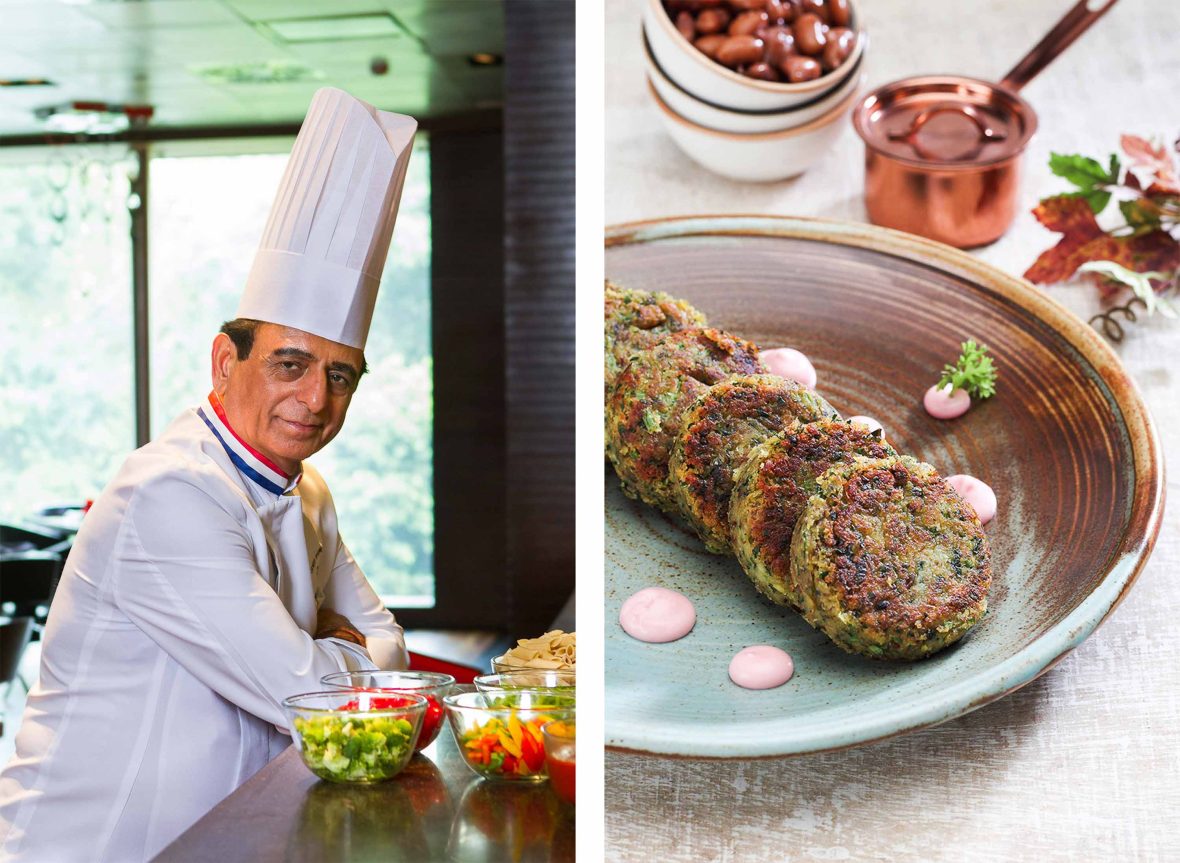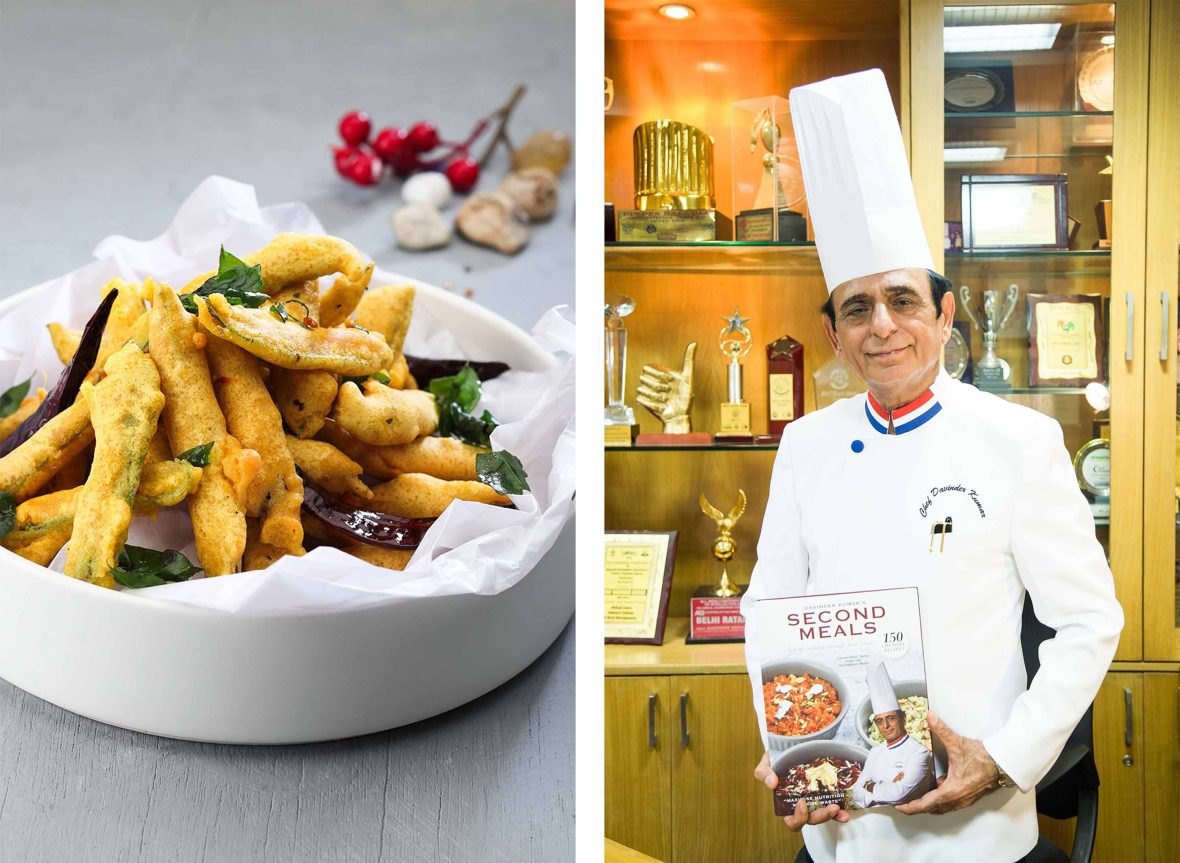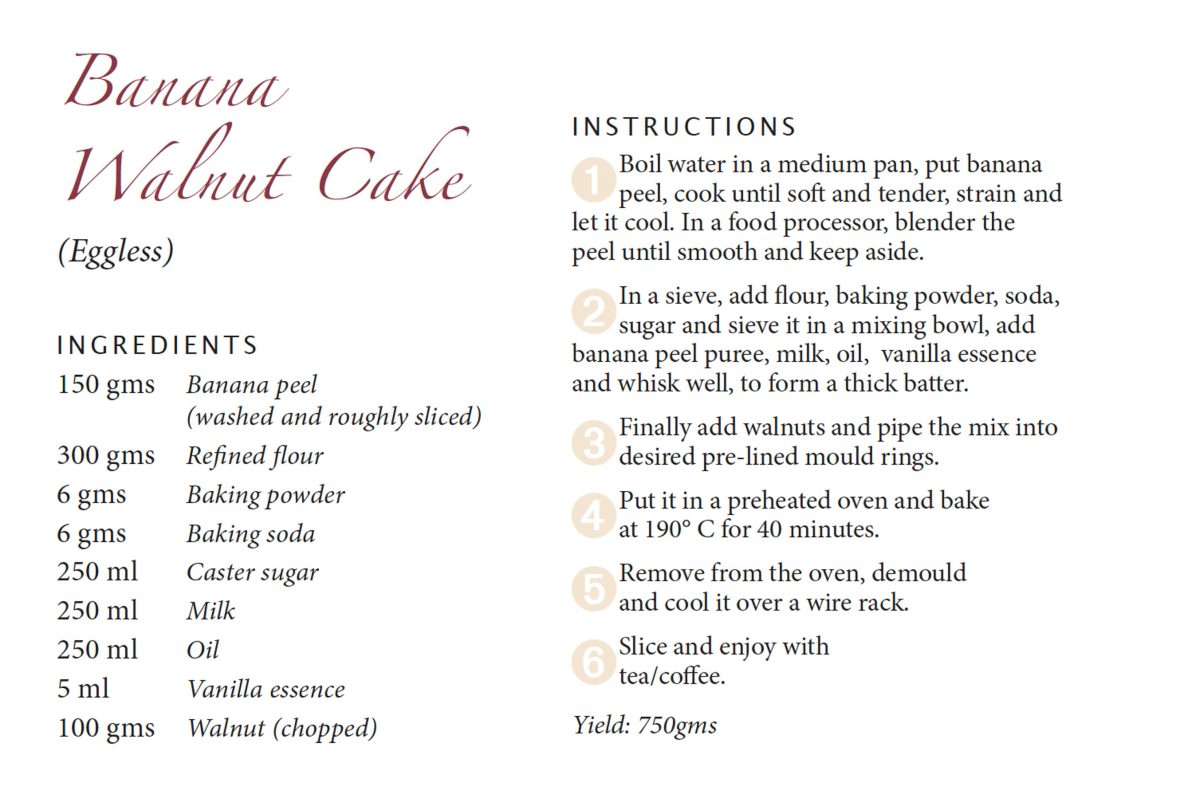
While nearly a third of all food produced is wasted (and responsible for around 6 percent of global greenhouse gas emissions), Executive Chef Davinder Kumar is creating luxury meals from food scraps at a luxury hotel in New Delhi.


While nearly a third of all food produced is wasted (and responsible for around 6 percent of global greenhouse gas emissions), Executive Chef Davinder Kumar is creating luxury meals from food scraps at a luxury hotel in New Delhi.
Jackfruit seed almond halwa, radish leaf chutney, spinach stem and leaf risotto, watermelon rind pickle, banana peel walnut cake… These are just a handful of the recipes that Davinder Kumar, Executive Chef and Vice President of Food & Beverage at Le Meridien hotel in New Delhi creates, using food scraps like rinds, peels, seeds and stems, which are usually discarded in the kitchen.
In a career spanning 50-plus years, Kumar, now 70, had begun to notice that nearly 10 percent of fruits and vegetables in hotels go to waste during processing. He’s determined that something has to be done to reduce it.
“My memory goes back to my childhood days when I saw my grandmother and mother respecting food ingredients,” Kumar reminisces. “They used every bit of the ingredients without wasting food.”
At the time, the availability of food products and resources was particularly limited, and yet he remembers how food waste wasn’t even visible. Meals were prepared with love, care and respect.

However, as Kumar entered the culinary profession in 1972, he witnessed a gradual shift in the way people perceived cooking, and noticed increased ignorance towards food waste. “On one side, there’s food—while on the other, there is hunger,” he tells me. “Food wastage has increased owing to the abundance of it now, lifestyle changes and the availability of convenience foods like ready-to-cook and ready-to-eat packaged meals.”
He also says he feels the newer generation is pressed for time, and often doesn’t think before throwing away edible parts. “They want everything easy and convenient,” he says. “Slowing down is necessary while thinking about those across the street who do not have food to live.”
“The scraps collected and processed are given to the various kitchens. They are incorporated in the recipes without making anyone feel that there is a scrap used.”
- Davinder Kumar
Today, food waste is a topic that’s far more widely discussed, especially in the context of sustainable eating and the climate crisis. As Kumar witnessed increasing amounts of food waste every year, he was determined that something had to change.
On a global scale, food waste is not just detrimental to the poor and hungry. It has a much larger impact on the environment and climate too. Apart from the time and energy spent on cooking, the agricultural land that grows food grains, pulses, fruits or vegetables, water used and energy in many forms go to waste whenever food is wasted. According to the United Nations, 13 percent of food produced is lost between harvest and retail, while an estimated 17 percent of total global food production is wasted in households, in the food service and retail put together.
Acutely aware that food waste occurs at different stages in the production process—from the agricultural supply chain and storage to food processing and what happens to leftovers after serving—Kumar decided to focus on the last two parts: “As chefs, we curate dishes out of various raw materials,” he says, “and I decided to focus on how I can reduce waste during processing. I have observed how food is wasted in large quantities.”

So how do Kumar and his team do it? As they’re planning a menu, they initially collect all the food scraps from the hotel’s various pantries and kitchens. The scraps are then separated, washed, cleaned and chopped—before their transformation alongside other ingredients into delicious dishes that you’d never guess were made from food scraps.
“It’s very important that the right scrap is used in the right dish,” says Kumar. “For example, the hotel’s bakery receives the carrot shavings, the pulps go to the confectionery section, stems in the soup section, and so on. They are incorporated in the recipes without making anyone feel that there is a scrap used.”
Kumar tells me how often he’s seen people chopping coriander, using the ‘premium’ part, in other words, the leafy upper part, but throwing away the root. “This was happening everywhere,” he says. It was this kind of observation that inspired him to get something down on paper. “I experimented with various ingredient combinations and tried to pen down a reference book for upcoming generations to be able to convert food scraps into healthy meals.”

The result is Second Meals: Art of Cooking through Food Scraps which contains 150 creative recipes devised by Kumar, ranging from smoothies, detox water and quenchers, to salads, soups, main courses and desserts to salts, condiments and pickles.
Kumar is also keen to emphasize the nutritional value of scraps and wants people to know it’s healthy to cook using scraps: “The tagline for my book is ‘maximize nutrition, minimize waste,’” he adds.
Fifty years ago, when Kumar entered the culinary profession at the Oberoi Group [luxury hotel group], his choice of career didn’t exactly get approval from family and friends. He saw his friends and peers join fields like engineering, finance, accountancy or law instead.
So how do his dishes go down with guests? As you might expect, Kumar’s banana peel cake, chutneys and pickles have been very well-received—in fact, guests couldn’t tell the dishes even contained peel.
This was in great part down to Kumar’s laboratory-style experimentation with different ingredients and flavors during which he discovered that certain combinations didn’t always mix and match well. “We tried mango peel cake, but it didn’t turn out well. But when I reworked it with banana peel, it turned out very well,” he recalls.
“While cooking with scraps isn’t rocket science, it is an art,” Kumar adds. “If I have to make a hummus, I can use beetroot peel instead, or use broccoli or cauliflower stems in a soup or curry.”
Fifty years ago, when Kumar entered the culinary profession at the Oberoi Group [luxury hotel group], his choice of career didn’t exactly get approval from family and friends who saw his peers join more traditional fields like engineering, finance, accountancy or law.
“Getting into the profession was challenging,” says Kumar. “This profession wasn’t well recognized back then. When we joined, this field was dominated by khansamas (traditional inter-generational cooks).”
The khansamas considered their skills to be their true wealth. But as a result, learning from them was challenging as they feared the newer generation of chefs might steal their skills, leading to their possible job loss. “They were very insecure giving out recipes,” Kumar tells me. “Of course, today, everything is available online for free. I joined this profession because this was an upcoming profession and I wanted to do something where skills and craftsmanship were involved.”
Kumar, who has worked at renowned colleges including RIG Institute of Hospitality and Management, Greater Noida and International Institute of Culinary Arts, New Delhi, now trains junior chefs and students to cook using food scraps. He feels behavioral or mindset training towards avoiding wastage is as essential as the practical demonstration. Giving away leftover food to local charities is one way Kumar feels he can help: “One thing that helped me in training was to tell my trainees that what you’re doing is going to feed those hungry men across the street,” he says.

Many people today have relatively easy access to food, and in many societies there’s no shortage of it. And it’s this availability that Kumar believes has made some people seemingly less concerned about food waste. He feels his role lies in ensuring hotels at least adopt several steps to reduce food waste on the plate.
“In India, we have an affinity for abundance in everything,” says Kumar. “Nearly half of the food at lavish wedding receptions goes to waste. If we go to a [non-Asian] wedding in the US or UK, everything is portioned.” He suggests several measures at hotels, such as curtailing portion sizes, using smaller plates, interactive cooking [involving the guest in the preparing and ordering of food], or the option of customized, smaller portions to help reduce food waste on the plate.
Kumar also feels there’s been something of a sea change in the food and hospitality sector, which is the result of globalization, technological advances, lifestyle changes, increased disposable incomes, and the tourism boom. “Gen Z likes to spend more on themselves compared to previous generations,” says Kumar. “As India’s economy has opened up, and there are more opportunities for people to invest here and travel, the food and hospitality industry is going to grow even faster.”
However, what pains him the most is thinking of people who go to bed hungry which is why he has made giving leftover food to local charities part of his purpose, while leftover meat and bones are donated to animal shelters like Circle of Animal Lovers in South Delhi. “This is the beginning of my initiative and campaign against food waste,” says Kumar, “and I want to take it to the national level so that it becomes a guiding reference for future generations.”
***
Adventure.com strives to be a low-emissions publication, and we are working to reduce our carbon emissions where possible. Emissions generated by the movements of our staff and contributors are carbon offset through our parent company, Intrepid. You can visit our sustainability page and read our Contributor Impact Guidelines for more information. While we take our commitment to people and planet seriously, we acknowledge that we still have plenty of work to do, and we welcome all feedback and suggestions from our readers. You can contact us anytime at hello@adventure.com. Please allow up to one week for a response.

Arundhati Nath is an independent journalist, content strategist and children’s author from Guwahati, India. Her work has been published in The Guardian, CNN Travel, BBC News, Conde Nast Traveler, Al Jazeera and CSMonitor. She writes about travel, culture, parenting, development, women’s issues and the environment.








Can't find what you're looking for? Try using these tags: